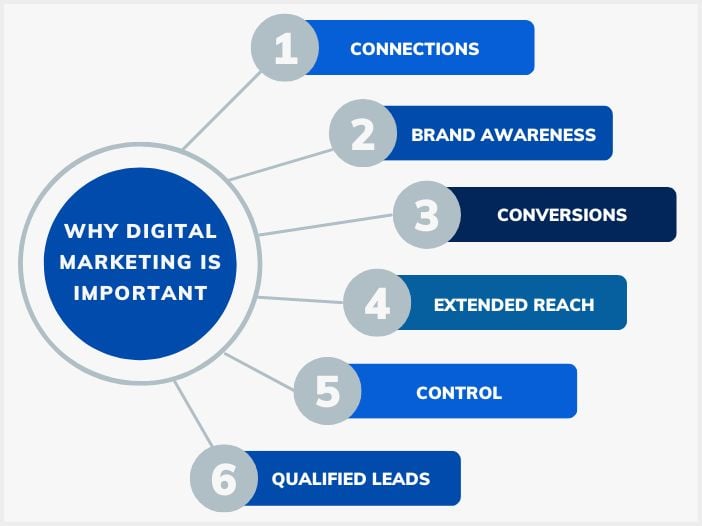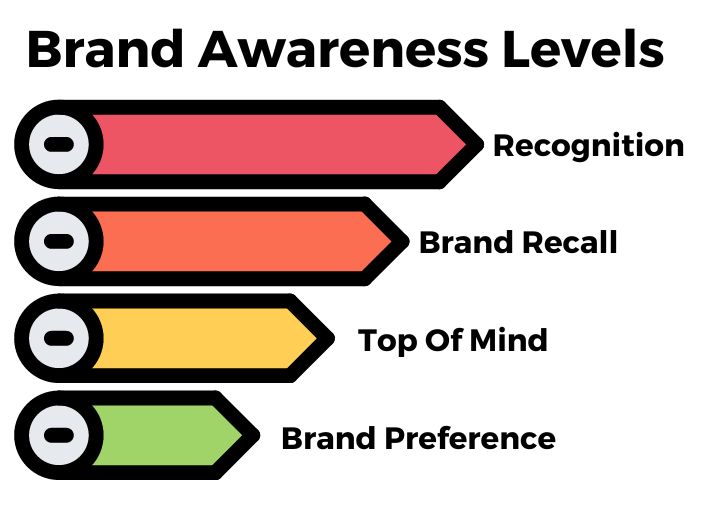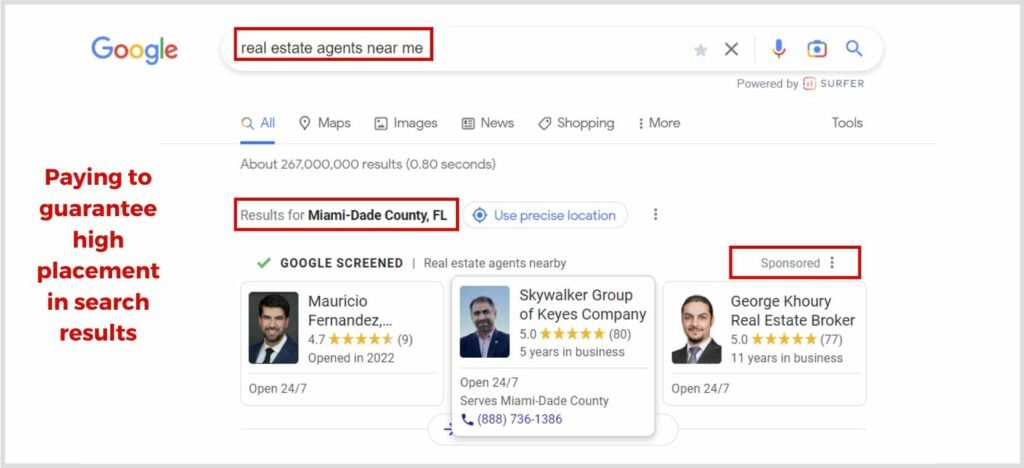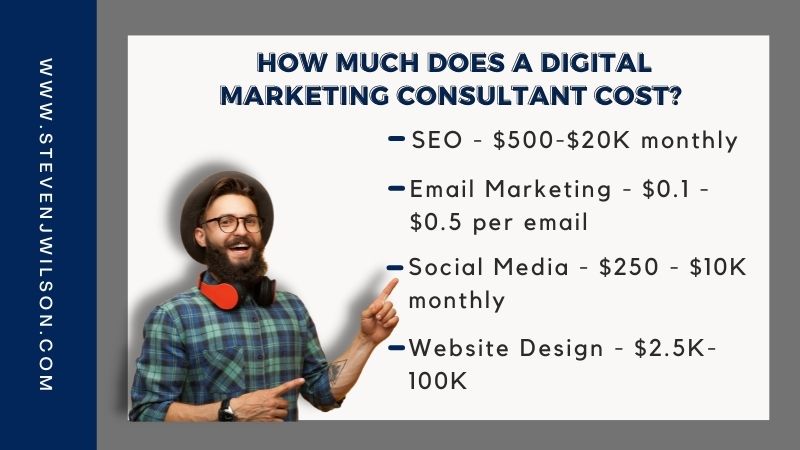The objective of digital marketing for B2B is usually to close more deals in less time by building relationships and trust with potential customers and providing them with the information they need to make a purchasing decision.
Now that digital marketing is a more accepted part of the B2B sales and marketing process, it’s time to take a more strategic approach to use it effectively.
Just because much of the buyer’s journey will happen digitally, you still have to focus on the core principles as you would offline, such as relationship building, networking, and providing potential customers with useful information.
As a B2B business, you will find it hard to succeed if you solely rely on automation and forget the personal touch that is still so important in business.
Key Takeaways:
- How B2B businesses can easier be discovered over the competition
- How B2B can be the preferred choice in their local area
- How B2B businesses can use digital marketing for better and faster conversions
- How digital marketing for B2B can increase all levels brand awareness
- How B2B companies can build trust through digital marketing

Why B2B Businesses Should Use Digital Marketing
There are many reasons why inbound marketing for B2B helps build your brand and online presence.
One of the most vital is the amount of data you can collect from potential customers.
The benefits of knowing what areas to target for your advertising campaigns or what type of content your audience is engaging with help you focus your time and budget on activities that will have the most ROI.
This information is critical in helping you reduce the time potential customers spend in the buying cycle.
The sooner you get started collecting this data the sooner you can optimize and scale your campaigns for maximum effect.
Digital marketing for B2B businesses also allows you to:
Connect with your target audience
When you research and define your target market, it is a matter of identifying their demographics, psychographics, online behavior, interests, and likes.
Given that wealth of information, you can concentrate your digital marketing efforts and presence on the sites and apps they frequent and topics that interest them.
Digital marketing for B2B allows them to segment and target your audience and curate the right messaging for them.
Brand Awareness
A catchy slogan, a professional-looking logo, or even a beautifully designed website is enough to get a prospect’s attention at all levels of the branding process.

Forget TV or events. With the right strategy, you can use digital media to make your brand memorable and stand out in a sea of ads.
It helps to be a top-of-mind brand, especially when clients are deciding among other competitors.
Your value and proposition should click with them the first time they read or come across your brand.
Increase Conversions
Conversions are much easier when the proposition is relevant and appropriate to the prospect.
Digital marketing for B2B helps target the right product, offer, or message to the correct client segment.
The call-to-action is customized to reflect the individual’s stage in the client’s buyer’s journey.
We commonly see these:
- Learn more – for prospects or Internet searches for your keywords
- Send a message – for those who are interested in what they saw in “Learn more”
- Call now – for those who are very interested to learn more about your offer
- Send me a quote – for those who’ve made up their minds and are in the purchase stage
- Share this post – for social media followers or clients who enjoyed or liked your post enough to share this with others
- Leave a Review – as a post-sales activity for recent clients
Get reviews and testimonials from happy clients as a testament to excellent service—and to entice future conversions.
There is nothing more convincing and trustworthy than “online” word-of-mouth marketing from third-party sources like Google My Business or Trust Pilot.
Extended Reach
The power of online media posting, reposting, and sharing is exponential!
Social media content and emails can add millions of impressions for your business.
You can use engagement buttons such as “repost,” “share,” or “like,” to make a post relevant again to existing and new followers.
Don’t let content you spent time on that got results in the past just sit there and do nothing.
You can give it a new lease on life by reusing or recycling it in whole or in part.
Sharing a post or tagging others is another way to extend reach and generate leads.
By doing the math, if one follower shares or tags five other friends, and if they have 1,000 followers— that’s potentially 5,000 eyeballs on your business!
If your content is relatable and unique, it’s more likely to be shared and talked about—and shared in a viral cycle.
That’s an awareness win for you or your digital marketing team.
Control (Return on Ad Spend)
Your digital marketing efforts need to yield productive results and convert to leads, and one way is to track ROA or Return on Ad Spend.
This is computed as Revenue Attributable to ads/cost of ads.
With a digital marketing strategy, you have better control over your media placement and allocation of your advertising budget.
For example, paid ads only charge you once clicked by the prospect.
That means your campaigns are hardworking and should be worth what you pay.
Unlike a billboard, where you pay regardless of the results you get from the campaign.
If you feel that your keywords or landing page are not converting to leads or sales based on your target, you can generate other search words or amend your call-to-action as needed.
You can also halt a campaign if you feel that you’ve already reached your financial limit.
A digital marketing strategy is flexible and easier to control—unlike traditional media that require fixed space, content, and duration.
Qualified Leads
In the past, cold calls meant prioritizing quantity over quality.
The more clients called the more chances of booking an appointment. It was a numbers game.
With digital marketing, you can streamline your reach and leverage “push and pull” techniques to get clients.
Social media works well to create awareness and interest for your business, and an easy-to-use sign-up page or interesting email blast will make reaching out to you faster.
A B2B business can incorporate specialized content in your materials to target niche groups and segments.
Those who respond or hit the “Yes, I’m interested” button would most likely be your bull’s eye target market for qualified leads.

Digital Marketing for B2B Tips
Having a solid marketing plan is vital to creating successful digital marketing campaigns.
Here are the most effective strategies you need to consider:
Content marketing for B2B
Creating and posting content regularly make this strategy interesting, entertaining, and highly relevant.
Potential clients, especially the young ones, love fresh and authentic content like posts, images, quotes, videos, or even the occasional funny or viral for a dose of humor.
Engagement with your content marketing will win their attention, conversion, and loyalty.
For B2B, your digital marketing efforts should aim to promote helpful, meaningful, and thought-provoking content that would make the prospect want to reach out to you.
As leaders in the industry, customers would look up to you for accurate forecasts or actionable tips—so use your “knowledge” to your content marketing advantage.
Websites for B2B
Your website is your online brand representation, your digital calling card.
Many B2B businesses once thrived in face-to-face meetings and office appointments.
Your website now stands as the digital head office—the centralized repository for all content, achievements and commendations, services offered, team members, and how to contact you.
Even when you cannot meet or invite new prospects for coffee, this is their way to get to know you.
Populate your B2B website with relevant articles, professionally taken photos, and an easy-to-use, easy-on-the-eyes layout and color template.
Whether searched organically or shared by a friend, make an impressive first impression on your present and future clients!
Lastly, remember mobile. A mobile-friendly website has become more critical as the years pass and could cause you to lose out on traffic and leads because of a poorly optimized mobile experience.
Blogging for B2B
Blogging is an add-on activity you can bring to the table, and you can reap the rewards of being hailed as your content creator.
There is added respect when you can curate your content and blog posts and lend your expertise through articles and features you publish on the website.
Sharing your knowledge and answering industry-related questions is a way to showcase your credentials and be a subject matter expert.
This raises your credibility and trustworthiness—both of which are vital traits businesses want in a business they plan to partner with.
The majority of content that appears in Google searches is text-based. So, don’t think of blogging as outdated or not worth your time.
On the contrary, improving your digital marketing strategy with SEO-rich content and backlinks is an excellent opportunity.
SEO for B2B
Effective search engine optimization (SEO) brings new prospects to your website or your designated landing page.
Simply put, it ranks higher in the Google search for specific keywords used to search for you, your competitors, or even your industry.
Being easily searchable has its perks, and number one is an increase in traffic.
The chances of being clicked are much greater than the following pages since the top three results are responsible for 70% of all clicks for that search term.
Good SEO is all about analyzing what customers use to search for you or similar companies—and also keywords that you constantly use in your content and posts (like a hashtag).
The more Google associates these keywords on your site, the more it is visited, and your ranking is higher. Together, they can help improve your organic SEO.

Local SEO for B2B
From content, we move to being found in a specific location, local SEO.
If you thought being searchable by adding a few relevant keywords was life-changing, try adding the geographical aspect.
This is greatly helpful when there are certain areas or locations that you want to “own.”
If your business has several offices in different areas, it makes sense to be easily searchable by your company name or industry and location.
This will integrate with the search engine’s Google Maps, and you and your business location will appear on every relevant search.
You want to show when someone searches, “(Your industry) near me.”
Citations can also help cement your name and location if certified or cited by others through reviews, directory entries, or a location tag.
Email marketing for B2B
Email marketing is like the cold call of the new age—but faster, less time-consuming, and much easier to manage.
Email campaigns are designed or sent out depending on the client’s need, solution requirement, or special occasion.
A simple “Happy Birthday!” is valuable to any celebrator.
Emails have so much potential—to create awareness, build engagement, inform, and invite to webinars—so the goal is to build your list and keep growing it.
Find templates and images that reflect your brand guidelines, and stick with that. With your customized logo, header, and engaging content, click and open rates should go higher.
Treat your email marketing list, and plan an effective, relevant, and non-intrusive email campaign.
Personalize your emails; only sometimes make a hard sales pitch or repetitive offer.
Trust for B2B businesses is based on relationship building, so make your emails work that way.
One bad, salesy email is enough to cause prospects and customers never to open another one of your emails again.
And most importantly, don’t forget the call to action (CTA). Give them some type of next step.
Social media marketing for B2B
Social media marketing is the heart of engagement, and you can optimize your online visibility with efficiently managed platforms.
Don’t be overwhelmed by the many forms of social media.
Your content should be consistent but just executed or tweaked slightly depending on the platform and target market.
Consider an official Facebook and Instagram account for your informational, social, advice, and other content.
A roster of media (gif, image, video) will help keep follower’s attention.
Sharing news or blog posts on Facebook is a quick way to get website or YouTube visits.
Twitter posts can mirror what’s on Facebook and can reach people who are not on Facebook.
TikTok and Snapchat should also be considered when targeting the Gen Z crowd, who may find video content and influencers their respected source of information.
On the other hand, if you are keen on capturing professionals or the working class, taking your branding to LinkedIn would be a sensible choice.
Don’t forget to join or participate in groups or networks for similar industries, trends—and where your target market’s interests are!
It’s an excellent way to engage with them in different channels and learn more about the VOC (voice of the customer).
Lastly, a calendar is a core part of a social media strategy.
You’re not expected to come up with the content on the fly.
A calendar makes it a long-term plan that you can easily plot with occasions, webinar dates, and rotating media types to prevent reader fatigue.
Search Engine Marketing for B2B
Search Engine Marketing (SEM) is the paid version of SEO to increase search visibility.
SEM gets you a top slot on the search engine results once your client types the selected keywords.

This is why keyword research is crucial to your success here.
A guaranteed top (and front) spot is premium real estate, ensuring your prospective clients see you first.
You’ll only pay once the client clicks on your ad.
Complement your SEM campaign with other digital marketing tactics (social media + email) to get the clients searching, clicking, getting interested, and buying!
Video Marketing for B2B
Video marketing is the best way to capture people’s attention and interest since a large portion of the market is going video first to find the answers to their questions or get recommendations.
Your B2B topic may be the most popular read, so placing answers and snippets of information in a video format makes it easier to comprehend and fun to watch.
Add some music, effects, and subtitles, and you can win over fans as you showcase your knowledge on your B2B topic and the problems you solve.
Make it a series so prospective clients will follow your page and channel, and others who come across your page will also be engaged.
YouTube channels that simply show your process get massive views without talking or needing you to be on camera.
For example, simple videos showing your manufacturing process or how you put together a product can be very engaging.
This is a great way to introduce new products or services without having to do a salesy video.
Webinars for B2B
A step up to video marketing is planning and holding a webinar.
Don’t let location, budget, or planning constraints stop you from conducting a talk or seminar.
Hosting a web seminar will make it convenient for more to attend—and they can share the invite with others too!
Here’s a chance for you to showcase your industry skills and expertise and present what you know, and offer to individuals who are interested in your services.
You can feature solutions to well-researched client issues or feature a niche offering that you have.
Webinars can help achieve other business objectives without the enormous costs of holding live events, sponsoring seminars, or joining TV shows.
Fortunately, you can do a webinar one time and then it can be an automated webinar that you can use for years to come for customers interested in this type of service.

Digital Marketing for B2B FAQs
How much do B2B businesses spend on marketing?
As a good starting point, B2B businesses interested in growing the business and targeting a large audience should allot about 4% to 10% of their revenues to marketing.
The marketing mix should include digital marketing and its customization and automation capabilities.
Is Digital Marketing helpful for B2B?
Digital Marketing is helpful for any business and industry because it builds brand awareness, reaches your target audience with the right call-to-action, and increases traffic to your website or social media pages.
A digital marketing strategy can support a B2B company’s objective of boosting sales, referrals, client loyalty and retention, and satisfaction.

How much does a digital marketing consultant cost?
Depending on the complexity and services required, a digital marketing consultant’s costs can range from $2,500 to $12K monthly, or if you’re eyeing a one-time project, that’s $1K to $7.5K.
Another average you can look at is the hourly rate, that’s about $140 (worldwide average) and $161 (US average).
For reference, digital marketing services range from:
- SEO – $500-$20K monthly
- Email Marketing – $0.1 – $0.5 per email
- Social Media – $250 – $10K monthly
- Website Design – $2.5K-100K
Regardless of the digital marketing package or services required, always remember that a good strategy will help your B2B company reap benefits exponentially as long you remain consistent and continue executing the plan.





